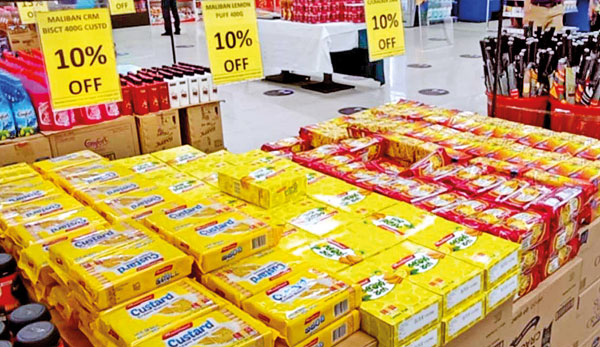News
Producers blame ingredient costs for pricey biscuits and buns
View(s):By Chrishanthi Christopher
Manufacturers say they are compelled to raise retail prices and Government intervention is needed to rein in the prices of ingredients.

Biscuits now beyond the reach of many. Pix by Akila Jayawardana
The Bakery Owners Association said that the acute shortage of wheat flour in the local market has encouraged unscrupulous traders to increase prices, pushing many small-scale bakeries and confectioners to shut down.
Association president N. K. Jayawardena said about 1,500 bakeries and associated businesses have closed down causing job losses of about 100,000 people.
He said wheat flour now sells at Rs 300 a kilo in the underground market. From the time the Government removed price controls on wheat flour in October 2021 the price has continued to rise every month. “A kilogram of wheat flour that was sold at Rs 85 last year is now selling at Rs. 300 or more.’’
![IMG_20220819_113245[1]-copy](http://www.sundaytimes.lk/220821/uploads/IMG_20220819_1132451-copy.jpg)
Bread that was sold at Rs. 60 is now between Rs. 190 and Rs.250
In addition, the rising price of sugar, margarine, eggs, and palm oil, adds to production costs.
The price of a loaf of bread that was sold at Rs. 60 is now between Rs. 190 and Rs.250. Tea buns now cost between Rs. 75 and Rs. 100.
The bakery owners had written to President Ranil Wickremesinghe last week, urging him to take immediate measures.
Biscuit manufacturers also acknowledged that prices have skyrocketed beyond the reach of many people. A mere 100 gram packet of ordinary biscuits sold at Rs. 20 to Rs.30 is now priced above Rs 100.
Manufacturers maintain that prevailing prices reflect the increases in the cost of main ingredients.
Lanka Confectionery Manufacturers Association (LCMA) said this week that prices of the main ingredients, wheat flour, sugar and vegetable oil, have risen.
A kilo of wheat flour, which was once Rs. 77, now sells at Rs. 290. Sugar has jumped to Rs. 320 from Rs. 114 a kilo, and vegetable oil has risen from Rs. 475 to Rs. 1,400 a kilo.
In addition, the COVID-19 pandemic in 2020-2021 has made the situation worse. Freight charges have also increased, they said.
Association president S.D. Suriyakumar predicted that businesses could close down causing job losses of about 50,000 people. In addition, about 500,000 indirect jobs would be at risk.
The companies export to Malaysia, Indonesia, Thailand, Vietnam, and Bangladesh, bringing in up to Rs. 200 million annually, he said.
Since 2021, the confectionery makers have taken a hit from the ban on palm oil imports. The industry needs around 1,500 metric tons of palm oil per month, he said.
Repeated representations made to the Government to help prevent the collapse of the industry have gone unheeded.
Mr. Suriyakumar said that these constraints have forced many of the LCMC members to look to moving overseas. Already some have set up businesses in Bangladesh and Ghana. Myanmar is another option, he said.
The best way to say that you found the home of your dreams is by finding it on Hitad.lk. We have listings for apartments for sale or rent in Sri Lanka, no matter what locale you're looking for! Whether you live in Colombo, Galle, Kandy, Matara, Jaffna and more - we've got them all!

